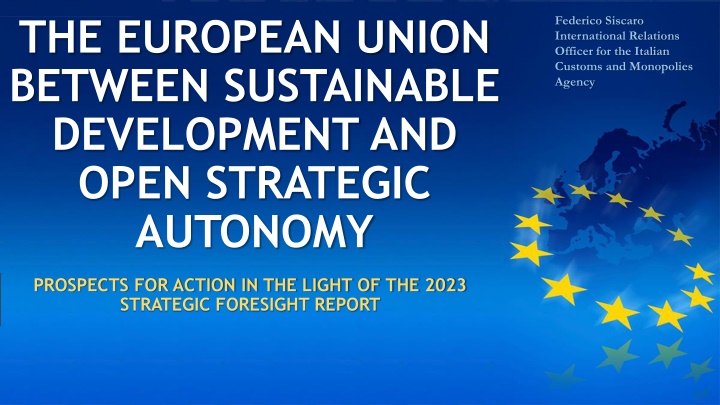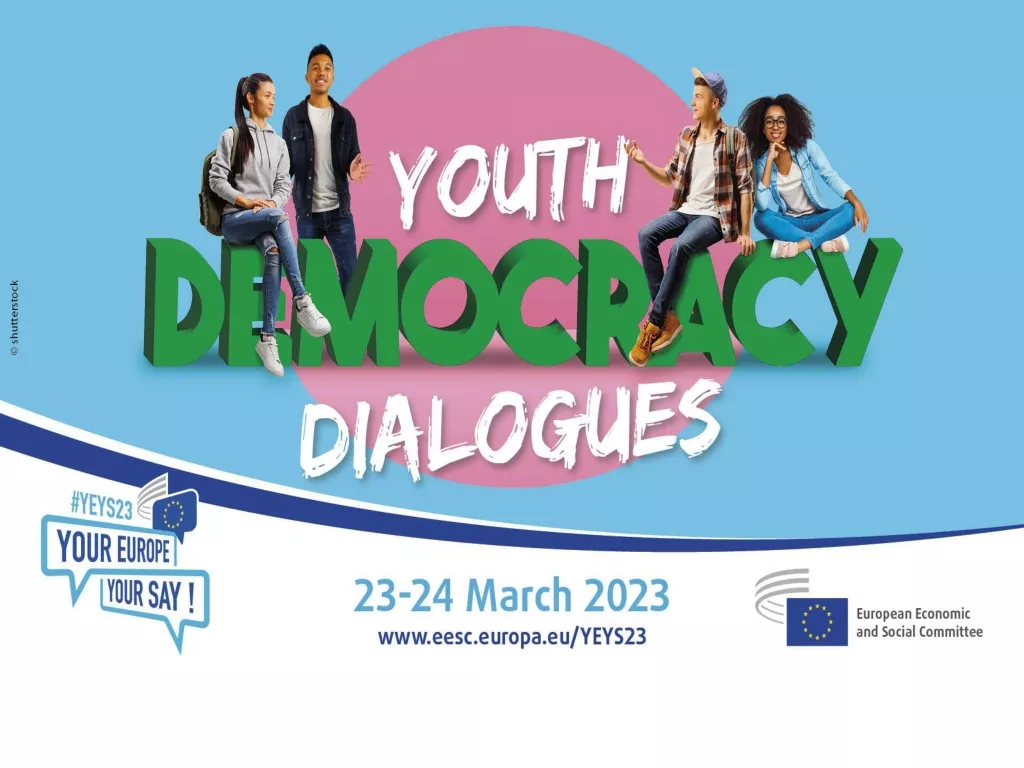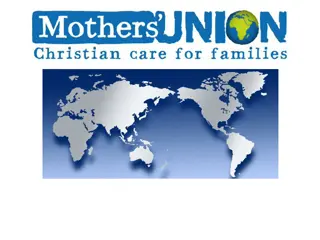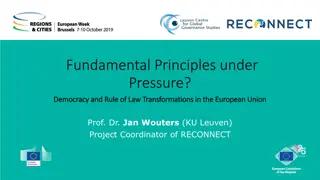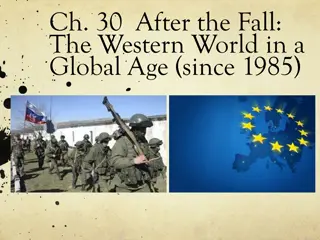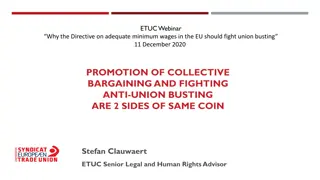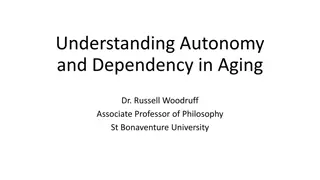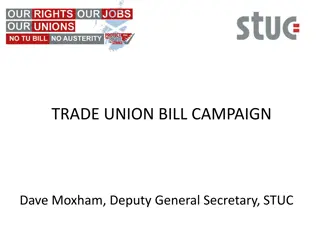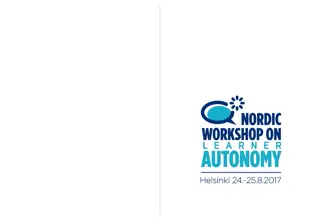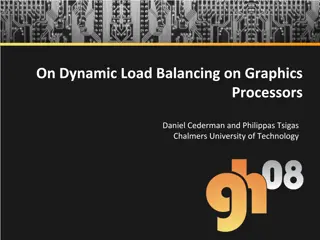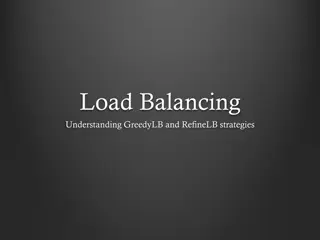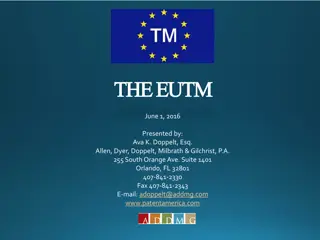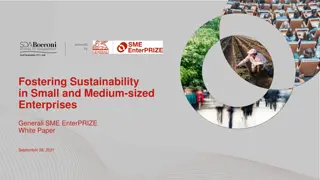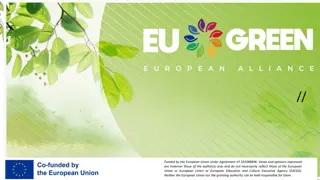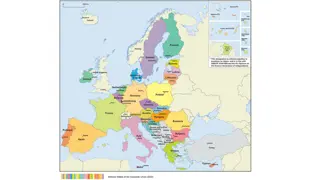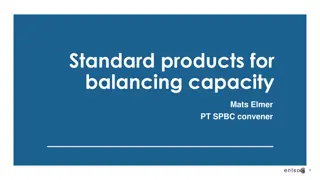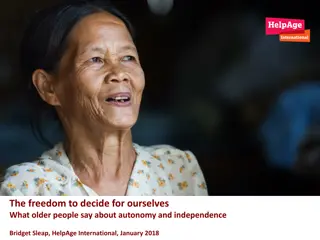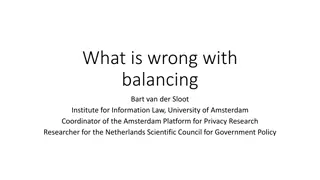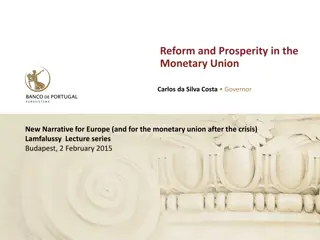Balancing Sustainable Development and Open Strategic Autonomy in the European Union
The European Union is navigating the challenge of promoting sustainable development while pursuing open strategic autonomy. President von der Leyen's leadership has driven ambitious sustainability policies like the European Green Deal. The 2023 Strategic Foresight Report emphasizes the intertwined nature of sustainability and strategic autonomy in EU policies, highlighting the need for resilience and global influence. The report outlines key areas for action, focusing on a net-zero economy, sustainable initiatives in a shifting multipolar world, and supporting developing countries through climate diplomacy and trade strategies.
Download Presentation

Please find below an Image/Link to download the presentation.
The content on the website is provided AS IS for your information and personal use only. It may not be sold, licensed, or shared on other websites without obtaining consent from the author.If you encounter any issues during the download, it is possible that the publisher has removed the file from their server.
You are allowed to download the files provided on this website for personal or commercial use, subject to the condition that they are used lawfully. All files are the property of their respective owners.
The content on the website is provided AS IS for your information and personal use only. It may not be sold, licensed, or shared on other websites without obtaining consent from the author.
E N D
Presentation Transcript
THE EUROPEAN UNION BETWEEN SUSTAINABLE DEVELOPMENT AND OPEN STRATEGIC AUTONOMY Federico Siscaro International Relations Officer for the Italian Customs and Monopolies Agency PROSPECTS FOR ACTION IN THE LIGHT OF THE 2023 STRATEGIC FORESIGHT REPORT
The EU faces a crucial challenge in today's world: balancing the promotion of sustainable development and the pursuit of open strategic autonomy. The EU's commitment to sustainability is inspired by the United Nations Sustainable Development Goals (SDGs) and the 2030 Agenda. Under President von der Leyen's leadership, the EU has unveiled an ambitious policy agenda dedicated to advancing sustainability, as showed by the realization of the European Green Deal and Recovery and Resilience Plans. At the same time, due to several international crises, the notion of "Open Strategic Autonomy" has emerged. This concept combines strengthening the EU's strategic autonomy in key sectors with a commitment to multilateralism, international cooperation, and global partnerships. The Strategic Foresight Report 2023 envisages the pursuit of sustainability in the context of the realization of open strategic autonomy. It underscores how the two goals are strictly intertwined in EU policies.
THE 2023 STRATEGIC FORESIGHT REPORT SHEDS SUSTAINABLE DEVELOPMENT ENHANCES EU S RESILIENCE, GLOBAL INFLUENCE, WHICH ARE VITAL FOR ACHIEVING STRATEGIC AUTONOMY IN AN INTERDEPENDENT WORLD. LIGHT ON HOW INNOVATION AND THE CHALLENGES AND TEN AREAS FOR ACTION, AMONG WHICH WE WILL FOUCUS ON TWO SPECIFIC ISSUES REPORT OUTLINES SIX KEY 2. THE PURSUIT 2. THE PURSUIT OF A NET OF A NET- -ZERO ECONOMY IN ECONOMY IN THE THE BACKGROUND OF BACKGROUND OF OPEN STRATEGIC OPEN STRATEGIC AUTONOMY AUTONOMY 1. THE 1. THE ZERO REALIZATION OF REALIZATION OF SUSTAINABILITY SUSTAINABILITY INITIATIVES IN A INITIATIVES IN A SHIFTING SHIFTING MULTIPOLAR MULTIPOLAR WORLD WORLD
THE QUEST FOR SUSTAINABILITY IN AN INCREASINGLY MULTIPOLAR WORLD International crises and rising geopolitical tensions have ushered in a multipolar global order. The advancement of sustainable development objectives compels the empowerment of the EU's global stance through a multi-faceted and integrated approach of policymaking SUPPORTING DEVELOPING COUNTRIES A NEW TRADE STRATEGY CLIMATE DIPLOMACY incorporating sustainability clauses into Free Trade Agreements providing technical assistance and capacity- building to implement sustainable policies elevating EU's Global Leadership in sustainability standards sustainability-oriented use of the Generalised Scheme of Preferences a more assertive action in international fora (e.g. COP27) the Global Gateway Strategy
ACHIEVING A NET-ZERO ECONOMY IN THE CONTEXT OF OPEN STRATEGIC AUTONOMY Sustainability is a competitive advantage, necessitating global leadership in the net-zero industry. To achieve this, the EU must bolster industrial capabilities, enhance supply chains resilience, and leverage its influential position in the world as a major trading bloc to promote high sustainability standards. PROMOTING MARKET FAIRNESS AND RESPONSIBLE BUSINESS PRACTICES ENHANCING INDUSTRIAL CAPACITY IN STRATEGIC GREEN TECHNOLOGIES MAKING STRATEGIC SUPPLY CHAINS MORE RESILIENT Reduce and diversify foreign dependencies in strategic sectors (i.e. semiconductors, raw materials, batteries) Massive investments in research, development, and manufacturing of net-zero technologies. Forcing trading partners to adopt similar green policies. transformation from a net-zero technology importer to a manufacturer. Economic security strategy to assess future dependencies and maintain autonomy. Embedding human rights and environmental concerns into corporate practices and governance. Coordinated measures: European Green Deal Industrial Plan, Net Zero Industry Act, Critical Raw Materials Act. Importance of preserving collaboration and promoting industrial cooperation agreements (TTC). Carbon Border Adjustment Mechanism (CBAM); Deforestation Regulation, Directive on corporate sustainability
BALANCING SUSTAINABILITY AND STRATEGIC AUTONOMY Overall, this presentation explores the intersection of sustainable development and strategic autonomy Achieving sustainability means combine it with the EU s open strategic autonomy, integrating both into the spectrum of EU policies Key areas of action include strengthening the EU's global presence and reinforcing the Single Market for a net-zero economy If we are to achieve the sustainability transition, it will be crucial in the upcoming future to place sustainability at the heart of the EU s open strategic autonomy, so as to deliver on a triple promise: a healthy planet and thriving environment; economic growth that is decoupled from resource use and environmental degradation; and an assurance that no person or place will be left behind
THANK YOU FOR YOUR ATTENTION Federico Siscaro International Relations Officer for the Italian Customs and Monopolies Agency
